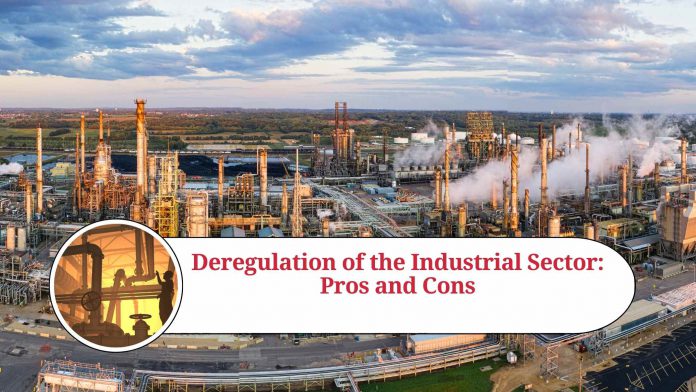The Deregulation of Industrial Sector: Understanding its Impact
Deregulation is the process of removing or reducing government regulations and restrictions on an industry or sector. The deregulation of the industrial sector is a complex and controversial issue that has been the subject of much debate and discussion over the past few decades. In this blog, we will explore the various aspects of the deregulation of the industrial sector, its impact on the economy, and the different views on this subject.
What is Deregulation?
Deregulation is the process of reducing or eliminating government regulations and restrictions on industries or sectors. The purpose of deregulation is to create a more competitive market, increase efficiency, and reduce the cost of goods and services. Deregulation can be achieved through various methods such as legislative changes, executive orders, or administrative actions.
Deregulation of the Industrial Sector
The deregulation of the industrial sector refers to the reduction or elimination of government regulations and restrictions on industries such as manufacturing, mining, and construction. The main goal of deregulating the industrial sector is to increase competition, reduce the cost of production, and promote economic growth.
Impact of Deregulation on the Economy
The impact of deregulation on the economy is a highly debated topic. Supporters of deregulation argue that it leads to increased competition, lower prices, and greater efficiency. They argue that deregulation creates a more level playing field and encourages innovation and investment in the private sector.
Critics of deregulation argue that it can lead to increased monopolies, reduced consumer protection, and decreased safety and environmental standards. They argue that deregulation can lead to a race to the bottom, where companies prioritize profits over safety and the environment.
Views on Deregulation
There are different views on deregulation among policymakers, economists, and the public. Some argue that deregulation is necessary to promote economic growth and job creation, while others believe that government regulations are necessary to protect consumers, workers, and the environment.
Advantages of Deregulation
One of the main advantages of deregulation is that it can increase competition in the market. When there are fewer regulations, it is easier for new companies to enter the market, which can lead to greater innovation and lower prices for consumers. Deregulation can also lead to increased efficiency and productivity as companies are able to operate with fewer restrictions.
Another advantage of deregulation is that it can reduce the cost of doing business. Regulations can be costly for businesses, as they require additional resources to comply with the rules and regulations. By reducing or eliminating regulations, businesses can reduce their costs, which can lead to lower prices for consumers.
Disadvantages of Deregulation
There are also disadvantages to deregulation. One of the main concerns is that it can lead to reduced safety and environmental standards. Without regulations in place, companies may prioritize profits over safety and the environment, which can have negative consequences for society.
Another disadvantage of deregulation is that it can lead to increased monopolies. When regulations are reduced, larger companies may be able to gain an unfair advantage over smaller competitors, leading to a less competitive market.
Conclusion
Overall, the deregulation of the industrial sector is a complex issue with advantages and disadvantages. While deregulation can lead to increased competition, lower prices, and greater efficiency, it can also lead to reduced safety and environmental standards and increased monopolies. Policymakers must carefully weigh these pros and cons when considering deregulation and work to strike a balance between regulation and deregulation to promote a healthy and competitive economy.
Read more useful content:
Frequently Asked Questions (FAQs)
What is the industrial sector?
The industrial sector is a broad category that includes manufacturing, mining, construction, and other similar industries involved in the production of goods and services.
What is deregulation?
Deregulation is the process of removing or reducing government regulations and restrictions on an industry or sector.
Why is deregulation important?
Deregulation is important because it can lead to increased competition, lower prices, and greater efficiency in the market.
What are some examples of deregulation in the industrial sector?
Examples of deregulation in the industrial sector include the removal of regulations on pollution and emissions standards, reduced regulations on labor and worker protections, and the elimination of tariffs and trade barriers.
How does deregulation affect consumers?
Deregulation can have both positive and negative effects on consumers. While it can lead to lower prices and increased competition, it can also lead to reduced safety and environmental standards.
How does deregulation affect businesses?
Deregulation can lead to reduced costs for businesses, as they no longer have to comply with as many rules and regulations. However, it can also lead to increased competition and reduced profits for some companies.
What is the difference between deregulation and privatization?
Deregulation refers to the reduction or elimination of government regulations and restrictions on an industry or sector, while privatization refers to the transfer of ownership and control of government-owned assets or services to the private sector.
What are the main arguments for deregulation?
Supporters of deregulation argue that it leads to increased competition, greater efficiency, and lower costs for businesses and consumers. They also argue that it encourages innovation and investment in the private sector.
What are the main arguments against deregulation?
Critics of deregulation argue that it can lead to reduced safety and environmental standards, increased monopolies, and reduced protections for workers and consumers.
Is deregulation always beneficial?
No, deregulation is not always beneficial. It can have both positive and negative effects, and policymakers must carefully consider the potential consequences before implementing deregulation policies.





















That was exactly what I was looking for. You have done a wonderful job communicating your message. Keep up the good work.